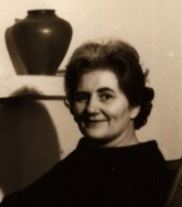Auður Sveinsdóttir Laxness (20 July 1918 – 29 October 2012) was an Icelandic writer and craftswoman, credited with influencing the design and popularity of the Icelandic Lopapeysa sweater during the mid-20th century. Her husband was Icelandic Nobel Literature laureate Halldór Laxness, and Auður worked as his secretary and writing collaborator for many years. In 2002, Auður received the Grand Cross of the Order of the Falcon for her contributions to Icelandic culture.[1]
Auður Laxness | |
|---|---|
 | |
| Born | 20 July 1918 |
| Died | 29 October 2012 (aged 94) |
| Education | University of Iceland |
| Occupation(s) | Writer, craftswoman |
| Spouse | Halldór Laxness |
| Children | Two |
Early life and marriage
editAuður was born in the Icelandic village of Eyrarbakki on 20 July 1918,[2] to Halldóra Kristín Jónsdóttir and Sveinn Guðmundsson. Her father was a blacksmith and when she was seven years old[3] they moved to Vesturbær, the west-end of Reykjavík.[2][4] She attended the University of Iceland and passed an examination at the Reykjavik University of Technology[3] to become an X-ray technician. She began working as an X-ray specialist at the National University Hospital of Iceland[5] in the late 1930s and would work there for twelve years. In 1937, she met the writer Halldór Laxness at her work.[3][6] While she was working, she also enrolled in courses at the Icelandic Arts and Crafts School.[3]
In 1945, Auður married Laxness[2][4] and the following year she graduated and passed her examinations in handicrafts.[3] The couple had two daughters, Sigríður and Guðný, and they lived in a house called Gljúfrasteinn, located in Mosfellsbær.[4] Auður supported her husband's writing as his secretary and "close collaborator" up until his death in 1998.[4]
Writing, politics, and handicrafts
editIn 1944, Auður was among the founders of Melkorka, an Icelandic women's magazine.[4] The magazine ran from 1944 to 1962, publishing both fiction and nonfiction on women's culture and politics.[7] Auður was active in social affairs and women's rights campaigns during her lifetime.[4]
Auður held a position on the editorial board of crafts magazine Hugur og hönd, producing articles on traditional Icelandic handicrafts such as weaving and knitting.[4] Outside of her writing, Auður also designed her own knitting patterns for Icelandic wool,[4] taught at Varmárskóli Elementary School in Mosfellsbær for two years and worked briefly at the National Museum of Iceland.[3]
Lopapeysa sweater pattern
editIn an interview with media in 1998, Auður claimed to be the originator of the famed Icelandic Lopapeysa sweater pattern.[8] Although the true extent of her contributions has been disputed, historians generally believe that Auður did influence the final knitting pattern, possibly through her development of a "circular pattern over the shoulder" inspired by a book on Inca culture.[8] Another theory suggests that Auður brought back a version of the sweater after a trip to Greenland and replicated it herself during the late 1940s, inspired by old Icelandic patterns and imported embroidery techniques.[9]
Death
editAfter spending her final years at a home for the elderly in Reykjavík, Auður died aged 94 on 29 October 2012.[4]
See also
editReferences
edit- ^ "Fimmtán sæmdir heiðursmerki hinnar íslensku fálkaorðu" [Fifteen honored with the insignia of the Icelandic Order of the Falcon]. Morgunblaðið (in Icelandic). No. 141. Reykjavík, Iceland. 19 June 2002. p. 10. Retrieved 5 October 2017.
- ^ a b c "Auður Laxness er látin". visir.is (in Icelandic). 2012-10-30. Retrieved 2017-10-01.
- ^ a b c d e f "Áttatíu og fímm ára Auður Sveinsdóttir Laxness" [Eighty-five years old Auður Sveinsdóttir Laxness]. Dagblaðið Vísir (in Icelandic). No. 172. Reykjavík, Iceland. 30 July 2003. p. 32. Retrieved 5 October 2017.
- ^ a b c d e f g h i "Auður Laxness Passes Away". Iceland Review. 2012-10-31. Archived from the original on 2017-10-06. Retrieved 2017-10-01.
- ^ "Auður Sveinsdóttir". Gljúfrasteinn (in Icelandic). Mosfellsbær, Iceland: Gljúfrasteinn Laxness Museum. 2016. Archived from the original on 18 August 2016. Retrieved 5 October 2017.
- ^ "Húsfreyjan á Gljúfrasteini" [The housewife at Gljúfrasteinn]. Gljúfrasteinn (in Icelandic). Mosfellsbær, Iceland: Gljúfrasteinn Laxness Museum. 2016. Archived from the original on 25 March 2016. Retrieved 5 October 2017.
- ^ Neijmann, Daisy L., ed. (2006). A history of Icelandic literature. American-Scandinavian Foundation. Lincoln: University of Nebraska Press. p. 527. ISBN 9780803233461. OCLC 70230723.
- ^ a b Árnason, Árni (2014-05-05). "Screaming Jumpers". The Reykjavik Grapevine. Retrieved 2017-10-01.
- ^ Peterson, Pam (2013-01-24). "The Iconic Icelandic Sweater: Past and Present". Huffington Post. Retrieved 2017-10-01.